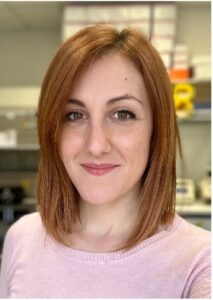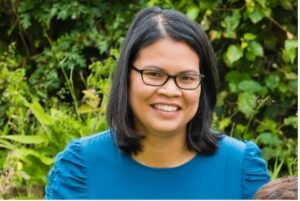This year, ECTS fellowship was awarded to Federica Scotto di Carlo and Syazrah Salam.
 Federica Scotto di Carlo: The ECTS fellowship grant which I have been rewarded this year aims at exploring the loss of Profilin 1 as a cause of mitotic defects in osteosarcoma. Osteosarcoma is the most common primary cancer of bone that typically affects adolescents but can also arise in the adults in association with Paget’s disease of bone. Current therapeutic treatments are poorly efficient because of the high burden of chromosomal instability that results in intra and intertumoral genetic heterogeneity.
Federica Scotto di Carlo: The ECTS fellowship grant which I have been rewarded this year aims at exploring the loss of Profilin 1 as a cause of mitotic defects in osteosarcoma. Osteosarcoma is the most common primary cancer of bone that typically affects adolescents but can also arise in the adults in association with Paget’s disease of bone. Current therapeutic treatments are poorly efficient because of the high burden of chromosomal instability that results in intra and intertumoral genetic heterogeneity.
I am currently investigating the role of Profilin 1 in the regulation of chromosome segregation in mesenchymal cells, and how its downregulation causes the development of osteosarcoma, using both cellular and mouse models. Being recipient of such a prestigious fellowship significantly contributes to my career in the field of bone cancer research. Currently, receiving the ECTS fellowship grant allows me to deepen the effect of Profilin 1 depletion at molecular level, and hence to progress in the context of mechanisms underlying osteosarcoma onset.
I hope to continue working in the field of bone cancer, and I believe that the ECTS fellowship definitely adds credibility to my research career. The ECTS support strongly encourages young researchers to pursue their scientific career. I am truly thankful for this unique opportunity that I could benefit from, and I hope my research will expand the knowledge in this field.
 Syazrah Salam: Fracture risk is four times higher in advanced chronic kidney disease (CKD) patients compared to non-CKD and this is associated with high mortality. Low bone quantity does not fully explain this high fracture risk, suggesting that impaired bone quality plays a major role. These patients have renal osteodystrophy (ROD) which is a spectrum of abnormal bone turnover, mineralization and microstructure. ROD may affect bone quality, such as stiffness and hardness. This has been demonstrated in animal experiments but not well studied in humans.
Syazrah Salam: Fracture risk is four times higher in advanced chronic kidney disease (CKD) patients compared to non-CKD and this is associated with high mortality. Low bone quantity does not fully explain this high fracture risk, suggesting that impaired bone quality plays a major role. These patients have renal osteodystrophy (ROD) which is a spectrum of abnormal bone turnover, mineralization and microstructure. ROD may affect bone quality, such as stiffness and hardness. This has been demonstrated in animal experiments but not well studied in humans.
The ECTS fellowship allows me to conduct a preliminary study to assess the difference in bone quality between advanced CKD and healthy controls. Circulating bone turnover markers will be used to assess bone turnover status. Trans-iliac bone biopsy specimens will undergo microCT to assess microstructure, and nanoindentation to assess bone stiffness and hardness.This fellowship is an important stepping stone for me as an early career researcher. It gives me the experience as a principal investigator, as I build my own research portfolio and independence in CKD mineral bone disorder (CKD-MBD).
Learning the nanoindentation technique during this fellowship compliments my skills in bone imaging and bone turnover marker analysis and interpretation. This will help me to drive further research which will benefit patients with this complex metabolic bone disease.
I have been an invited speaker at the ECTS congress and courses in the past. Thus, I am aware of the impact this fellowship has as a platform for me to showcase my work to an international audience.
As a committee member of the European Renal Osteodystrophy Initiative, I have developed a network with other researchers in this area who are also ECTS members. I am confident that the ECTS fellowship will continue to raise my research profile, foster future international collaboration and open up funding opportunities.
